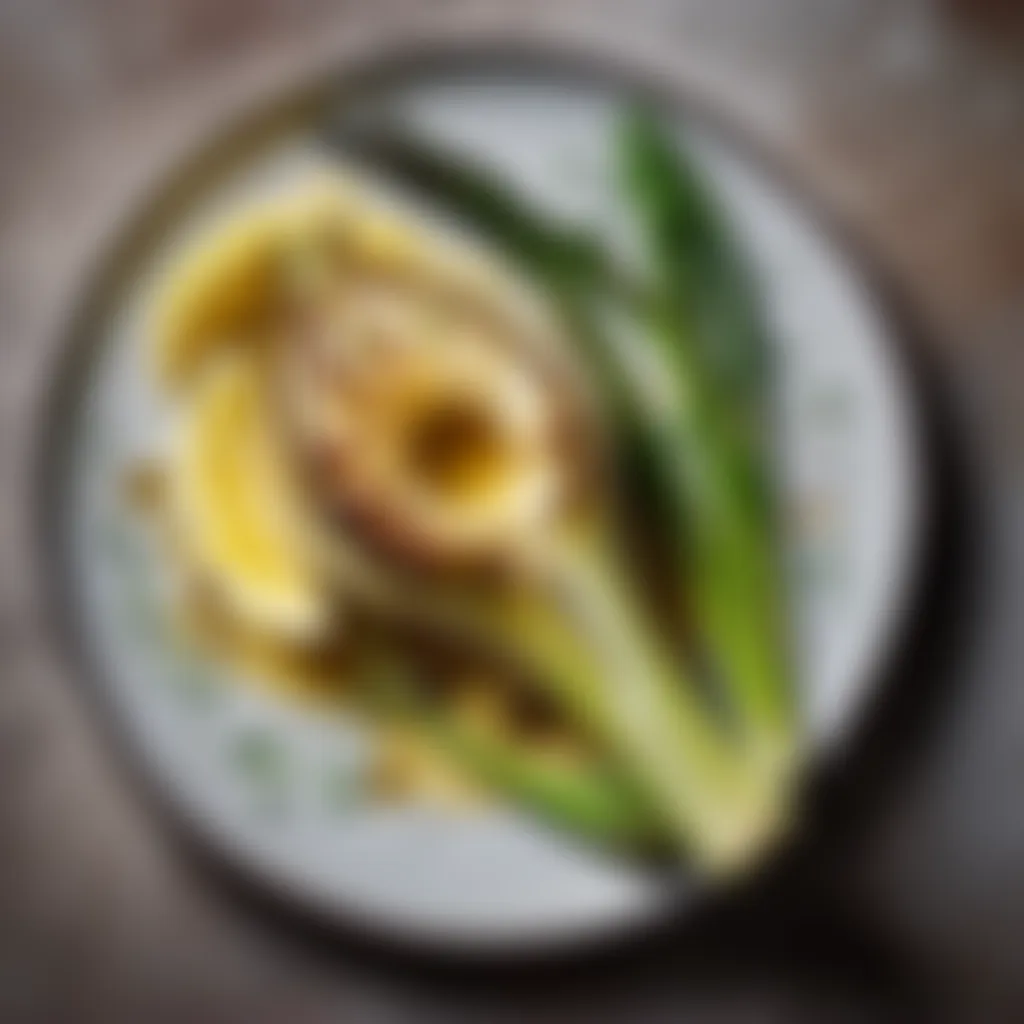The Many Uses of Fennel Bulb: Recipes and Benefits


Intro
Fennel bulb, often overlooked in the kitchen, is a culinary treasure waiting to be explored. Its unique flavor can add a delightful twist to dishes, while its numerous health benefits make it a fantastic choice for those looking to boost their nutritional intake. This bulbous vegetable, with its crunchy texture and subtle anise-like taste, can be used in a multitude of ways, from raw salads to hearty soups. Understanding how to make the most of fennel can turn an ordinary meal into something exceptional.
By incorporating fennel bulb into your cooking, not only do you elevate the flavor profile of your meals, but you also foster good health. Rich in antioxidants, vitamins, and dietary fiber, fennel aids in digestion, promotes heart health, and can even assist with weight maintenance. It’s a versatile ingredient that every home cook should keep in their pantry.
Now, let’s embark on this flavorful journey together, starting with the essentials.
Understanding Fennel Bulb
Fennel bulb is more than just a pretty face in the vegetable aisle; it is a culinary powerhouse packed with unique flavors and health benefits. The importance of understanding fennel bulb lies not only in its distinctive taste but also in its adaptability in various cuisines. This section serves as a cornerstone for readers aiming to appreciate and utilize fennel in their daily meals.
Botanical Profile
Fennel, known scientifically as Foeniculum vulgare, is a member of the carrot family (Apiaceae). This plant is characterized by its feathery fronds and a bulbous base that resembles an onion or a shallot. It originates from the Mediterranean region but now grows in various climates around the globe. Its ability to thrive in diverse environments reflects its resilience and versatility.
The bulb itself is a pale green to white color with a crisp texture. Its anise-like flavor, owing to the compound anethole, adds a sweet, licorice-like note to dishes. Understanding its botanical background can help you appreciate the depths of flavor it brings to your culinary creations.
Notably, fennel seeds are distinct from the bulb. They come from the flowering part of the plant and carry a stronger flavor profile, offering different culinary opportunities. So, whether you’re using the bulb in salads or infusing oil with the seeds, knowing the difference can impact your cooking significantly.
Cultivation and Harvesting
Cultivating fennel is not as daunting as it may seem to some. It prefers well-drained soil and abundant sunlight, making it an excellent addition to home gardens. Planting usually takes place in early spring, and as it grows, regular watering is crucial, especially in the summer months.
Harvesting fennel requires a keen eye. The bulbs can be picked when they reach about three to four inches in diameter. A gentle tug or a sharp knife can do the trick. Just remember to cut at the base, allowing the fronds to continue to grow. This not only provides more foliage for cooking but also keeps the plant alive for another harvest later in the season.
When harvested correctly, the flavor of fresh fennel is vibrant and full-bodied. Cultural practices around fennel cultivation often emphasize its role in sustainable gardening. Tending to your own fennel can yield a sense of achievement, enhancing the home-cooked meals you whip up for your family.
By understanding the botanical profile and the cultivation aspects of fennel bulb, you empower yourself with knowledge that makes each recipe you create not just a meal but an exploration of flavor and health.
Nutritional Information
Understanding the nutritional makeup of fennel bulb provides insight into how this vibrant vegetable can contribute significantly to a balanced diet. Rich in vitamins, minerals, antioxidants, and phytochemicals, fennel is more than just a culinary delight; it's a powerhouse of nutrients that can benefit overall health. For anyone aiming to enhance their meals while keeping health considerations in mind, knowing the nutritional information helps in making informed choices.
Vitamins and Minerals
Fennel bulb is a treasure trove of vitamins and minerals. Some of the key components include:
- Vitamin C: An antioxidant that plays a crucial role in immune function, skin health, and iron absorption.
- Potassium: Supports heart health and helps in managing blood pressure levels.
- Calcium: Essential for strong bones and teeth, and it assists in muscle function.
- Magnesium: Important for many biochemical reactions in the body, influencing muscle and nerve function, blood glucose control, and blood pressure regulation.
This vegetable also provides other B vitamins such as folate and Vitamin B6, which are vital for energy metabolism and brain health. For the health-conscious homemaker, introducing fennel into meals is an effective strategy to boost your family's nutrient intake while adding a unique flavor profile.
Calories and Macronutrients
Fennel bulb is not only low in calories but also offers a notable macronutrient profile. Specifically:
- Calories: Approximately 27 calories per 100 grams, making it an excellent low-calorie addition to various dishes.
- Carbohydrates: Contains about 7 grams of carbs, which includes dietary fiber, aiding digestion and promoting satiety.
- Proteins: Offers around 1 gram of protein; while not high in protein, it contributes to overall dietary needs when consumed as part of a balanced diet.
- Fats: Very low in fat, generally less than 0.5 grams.
These characteristics make fennel a perfect ingredient for those looking to maintain or lose weight without sacrificing flavor. By integrating fennel into your cooking, you can keep meals light, nutritious, and satisfying.
Antioxidants and Phytochemicals
Fennel bulb holds various antioxidants and phytochemicals that are known for their health-boosting properties. Among these are:
- Anethole: This compound not only gives fennel its distinct flavor but also shows potential anti-inflammatory and anticancer properties.
- Luteolin: An antioxidant that has been studied for its abilities to support brain health and reduce the risk of chronic diseases.
- Flavonoids: These compounds are known for their anti-inflammatory and antioxidant effects, which help in combating oxidative stress.
Incorporating fennel into everyday meals allows one to benefit from these compounds naturally without the need for supplements. As we understand the role of antioxidants and phytochemicals, it’s clear that fennel can play a vital role in a health-oriented diet.


Fennel bulb's nutritional profile not only enriches our meals but also contributes to a healthier lifestyle when incorporated thoughtfully.
This valuable understanding of fennel's nutritional information lays the groundwork for creatively integrating the bulb into various recipes, ensuring that both health and taste are prioritized.
Culinary Uses of Fennel Bulb
Fennel bulb is a culinary gem that brings a distinct flavor and nutritional bouquet to various dishes. Its versatility cannot be overstated, as it is adaptable across diverse cooking methods and paired with an array of ingredients. By understanding how to utilize fennel, cooks can not only elevate meals but also usher in its health benefits, making it a worthy addition to any kitchen.
The art of incorporating fennel into meals is not simply about flavor; it’s about striking a balance between taste and nutrition, providing health-conscious food lovers with exciting options. Fennel serves as a refreshing crunchy element in salads, a fragrant base in soups, or a caramelized treat when roasted. Each preparation method showcases a different aspect of fennel's character, inviting culinary exploration.
Raw Applications in Salads
In its raw form, fennel bulb can truly shine. The crisp texture and anise-like flavor make it a delightful addition to salads. Imagine a salad comprising thinly sliced fennel, crisp apples, and maybe a handful of toasted walnuts. This combination creates a perfect harmony between crunch, sweetness, and a subtle hint of licorice.
To prepare, simply slice the fennel bulb thinly and toss it with your choice of greens. A drizzle of lemon juice and olive oil can enhance the dish further. Not only is it refreshing, but the dietary fiber and vitamin C in raw fennel can make your salad both a tasty and nutritious option.
Sautéing and Stir-Frying Techniques
When it comes to cooking fennel, sautéing stands out as a particularly effective method. Sautéing allows the natural sugars in fennel to caramelize, lending the dish a robust flavor. Sliced fennel can be added to a hot pan with olive oil, creating a fragrant base for stir-fries or pasta dishes.
This technique is not just about cooking fennel on its own; it can complement other ingredients you have on hand. For a quick weeknight meal, toss fennel with bell peppers, onions, and your choice of protein. The gentle heat transforms fennel into a tender yet still slightly crunchy delight, enhancing both the aroma and taste of your dish.
Roasting for Depth of Flavor
Roasting fennel bulb envelops it in caramelization, producing a complex flavor that is hard to resist. Cut the fennel into wedges, drizzle with olive oil, and sprinkle with salt and pepper before placing it in a hot oven. The high heat will cause the natural sugars to caramelize beautifully. Roasted fennel pairs wonderfully with a variety of proteins and grains, providing a savory side dish. Incorporating roasted fennel into a grain salad with quinoa, feta cheese, and perhaps a few sprinkle of pomegranate seeds can create an impressive dish full of textures and colors, making it ideal for gatherings or special occasions.
Incorporating into Soups and Stews
In the realm of soups and stews, fennel makes for a terrific flavor builder. Its mild taste brings depth to broths, absorbing and enhancing flavors from other ingredients. Imagine a vegetable soup simmering with fennel, carrots, and potatoes—each ingredient lending its character to a warm bowl of nourishment. Cut the fennel into small pieces and sauté it before adding your other vegetables and broth. It can be the secret weapon in achieving that satisfying umami flavor, nudging the dish towards gourmet without breaking the bank.
Fennel in Fermentation
Fermentation has seen a rise in popularity, and fennel can be an unexpected yet beloved star in this field. When you pickle fennel, its natural crunch holds up, providing a textural contrast in various dishes. You can easily ferment sliced fennel with vinegar, water, and your choice of spices. The result is a vibrant condiment that can enhance sandwiches, salads, or a charcuterie board. This process not only preserves fennel but also introduces probiotics that can benefit gut health. It's a simple way to elevate your culinary repertoire while reaping health benefits.
Fennel is not just a vegetable for flavor; it’s a bridge that links health to culinary creativity.
Creative Fennel Recipes
Exploring creative fennel recipes is not just about tasting something new. It's about understanding the versatility this unique ingredient brings to the table. Fennel's slightly sweet, anise-like flavor profile adds complexity to both simple and elaborate dishes. Also, its crunchy texture enhances both appearance and mouthfeel. This section dives into a range of recipes that allow home cooks to experiment and discover the delights of fennel. Each recipe highlights its distinct character while providing various health advantages. It presents an excellent opportunity to integrate more plant-based nutrients into our meals.
Fennel and Citrus Salad
Incorporating fennel and citrus salad into your meal plan is a fantastic way to celebrate freshness. This salad balances the earthiness of fennel with the zesty brightness of citrus fruits like oranges or grapefruits.
To prepare:
- Slice the fennel bulb finely, showcasing its feathery fronds for decoration.
- Segment citrus fruits and toss them together with the fennel.
- A light drizzle of olive oil and a sprinkle of salt really ties the flavors together.
- Optional: Add chopped mint leaves for an extra pop of flavor.
This dish is refreshing and full of vitamins C and K, making it a great addition to any meal.
Creamy Fennel Soup
Creating a creamy fennel soup provides a cozy comfort that’s hard to beat. This dish embraces the mellow flavor of fennel while offering a warming embrace on chilly days.
To whip this up:
- Start by sautéing chopped onions and minced garlic in a pot.
- Cut the fennel bulb into chunks and add them to the pot, stirring until softened.
- Pour in vegetable broth and let it simmer until all ingredients are tender.
- Blend until smooth and swirl in cream or a dairy-free alternative for richness.
This soup is not only soothing but is also high in fiber and low in calories, making it a perfect light meal.
Grilled Fennel with Herbs
Grilled fennel with herbs can bring a delightful smoky flavor to the dish. Grilling fennel caramelizes its sugars, enhancing its natural sweetness. This recipe is perfect for summer cookouts.


To make:
- Slice the fennel bulb into thick wedges to prevent them from falling apart on the grill.
- Toss with olive oil, salt, pepper, and fresh herbs like thyme or rosemary.
- Grill for about 10-15 minutes, or until tender and slightly charred.
Serve alongside grilled meats or as a stand-alone side that evokes a Mediterranean feel. This dish is rich in antioxidants and supports heart health.
Fennel and Cheese Tart
Creating a fennel and cheese tart is a great way to use fennel's subtle flavor as a star ingredient. The sweetness of cooked fennel pairs beautifully with sharp cheeses.
How to prepare:
- Use a pre-made pastry crust or make your own.
- Sauté fennel until it's soft and sweet, then spread it evenly in the tart crust.
- Top with your choice of cheeses—goat cheese works wonderfully.
- Bake until the cheese is bubbly and slightly golden.
This savory tart can be served warm or at room temperature, making it versatile for any occasion. It’s an excellent dish to showcase fennel’s culinary flexibility.
Fennel-infused Oils and Dressings
Finally, fennel-infused oils and dressings are a superb way to harness the aromatic qualities of fennel in a more concentrated form. It's an easy way to enhance flavor without much fuss.
To make:
- In a small saucepan, heat olive oil and add crushed fennel seeds.
- Let steep on low heat for about 10-15 minutes.
- Strain the oil and use it in salads, drizzled over roasted veggies, or as a dip.
For dressings, mix fennel-infused oil with vinegar, a touch of mustard, and salt to create a vibrant vinaigrette. It brightens dishes while delivering the digestive benefits often associated with fennel.
These creative fennel recipes not only showcase the vegetable's versatility but provide a canvas for exploring flavors and textures, appealing to both health-conscious cooks and culinary adventurers alike.
Health Benefits of Fennel
Fennel bulb is not just a culinary delight but also a powerhouse of health benefits. Understanding the advantages that fennel contributes to our wellbeing can shed light on why integrating this vegetable into your meals is worth considering. Packed with vital nutrients and unique compounds, fennel supports various bodily functions, making it a true asset for anyone aiming for a healthier lifestyle. Whether you’re looking to improve digestion, balance hormones, or bolster your immune system, fennel offers a wide range of favorable effects that deserve a closer look.
Digestive Health Support
Fennel is renowned for its positive impact on digestive health. The presence of dietary fiber in fennel aids in keeping the digestive system running smoothly. It not only helps with regularity but can also alleviate discomfort associated with bloating and gas. In fact, fennel seeds have been traditionally used to soothe stomach issues in many cultures.
- Promotes healthy bowel movements
- Reduces bloating
- Eases gas discomfort
Moreover, fennel contains phytonutrients that help stimulate the production of gastric juices, which are essential for breaking down food. Regularly consuming fennel may lead to a happier gut, making it an excellent choice for anyone interested in enhancing their overall digestive status.
Anti-inflammatory Properties
Another noteworthy aspect of fennel is its anti-inflammatory benefits. Chronic inflammation can lead to various health complications, and consuming foods rich in antioxidants is a great way to combat this.
Fennel contains compounds such as anethole, which has been shown to reduce inflammation in the body. Studies suggest that it can also help in mitigating pain associated with inflammatory conditions such as arthritis and other joint issues.
- Fights chronic inflammation
- May alleviate joint pain
- Supports overall inflammatory status
Through its calming properties, fennel could be an excellent addition to your diet if you struggle with inflammatory concerns or want to enhance your body's resilience against inflammation.
Hormonal Balance and Menstrual Health
Fennel's potential benefits for hormone balance, especially in women, are worth mentioning. This vegetable contains phytoestrogens, which are plant-derived compounds that mimic estrogen in the body. These components can help in regulating hormonal levels, making fennel particularly beneficial during menstruation.
- Can ease menstrual cramps
- Supports hormonal balance
- May alleviate symptoms of menopause
For women who experience discomfort during their menstrual cycle, incorporating fennel into the diet may provide some relief. In addition, its ability to support hormonal balance is also noted during menopause, making it a versatile ally in women’s health.


Immune System Benefits
Finally, the immune-boosting properties of fennel are not to be overlooked. With a rich supply of vitamin C and antioxidants, fennel helps defend against harmful free radicals. A robust immune system is essential for fighting off infections and diseases, and adding fennel to your meals can be a simple yet effective way to enhance your body’s natural defense mechanisms.
- Rich in vitamin C
- Contains antioxidants
- Supports immune function
In summary, the health benefits of fennel are substantial and varied. From promoting digestive health to easing menstrual discomfort, this bulb is a valuable addition to your culinary repertoire, ensuring you not only enjoy delicious flavors but also nourish your body effectively. Incorporating fennel into your meals can lead to a multitude of advantages, making it a worthy ingredient for anyone seeking to improve their overall health.
Potential Risks and Considerations
Even the most beneficial ingredients can have their pitfalls. When it comes to fennel bulb, being informed about potential risks and considerations is crucial. While fennel is packed with nutrients, its consumption is not without possible drawbacks.
Allergic Reactions
Allergies can rear their ugly heads when you least expect it, and fennel bulb is no exception. Some individuals might find themselves reacting to fennel as if it were a bee sting. Symptoms could range from mild discomfort, such as itching or swelling, to more serious reactions, including difficulty breathing. It's essential for those with known allergies to celery, carrots, or mugwort, to approach fennel with caution, given that there are bound to be similarities in their botanical families. Always consider testing a small amount before diving headfirst into a delicious fennel dish. Don't forget: knowledge is power, and understanding your own body's reactions is key to safe eating.
Interactions with Medications
Many people treat cooking like chemistry class; mixing and matching ingredients without a full understanding of the consequences. It’s vital to keep in mind that fennel can interact with certain medications, particularly those processed by the liver. For instance, if you are taking medications such as anticoagulants or sedatives, fennel could potentially alter their effectiveness. Before adding fennel to your meals, consider having a chat with your healthcare provider. They can provide tailored advice, ensuring your culinary adventures don’t clash with your health routines.
"While fennel adds flavor and health benefits, always consult with a professional if you are unsure about interactions with medications."
Being aware of these potential risks allows you, as a health-conscious cook, to incorporate fennel into your meals with confidence and mindfulness. Embracing fennel isn’t just about enjoyment but understanding the larger picture of its role in your dietary habits.
Sourcing and Storing Fennel Bulb
Purchasing and keeping fennel bulb in peak condition is pivotal for both flavor and nutritional value. Understanding how to source and store this ingredient correctly can enhance your culinary creations significantly. If you’re aiming to amplify the essence of your dishes, fresher fennel will always deliver. Here, we will explore how to choose high-quality fennel and the best storage methods to maintain its freshness.
Selecting Quality Fennel
When it comes to selecting fennel, not all bulbs are created equal. The ideal fennel bulb should feel dense and firm in your hand. A bulb that feels spongy is likely an indicator of age. Look for closed fronds that have a vibrant green color; they should not be yellowing or wilting as that could suggest they are not fresh.
Here are some tips to consider while shopping:
- Size Matters: A medium-sized bulb usually provides the best flavor without being overly tough or woody.
- Skin Check: The skin should appear smooth and free from blemishes or dark spots, which can indicate decay.
- Fronds Are Key: Fresh fronds will have a strong aroma. If the scent is weak or absent, the bulb may not be fresh.
"Fresh fennel's unique flavor can completely transform a dish; choosing the right bulb is half the battle!"
Sometimes, the local farmers’ market can be a treasure trove of quality vegetables. Supporting your local growers not only helps you find fresher produce but is also a step towards sustainable cooking.
Proper Storage Techniques
Once you've got your hands on the freshest fennel possible, figuring out how to store it will affect its longevity and safety. Ideally, you want to store fennel in a way that preserves its all-important crunch and flavor. Here’s how:
- In the Fridge: Fennel should be kept in the crisper drawer of your refrigerator. Wrap it loosely in a plastic bag or in a beeswax wrap to retain moisture without causing mold. Avoid tight sealing, as that can lead to condensation and quicker spoilage.
- Use in Time: Aim to use your fennel within a week for optimal freshness. After this time, it may start to lose its crispness. You can see some discoloration, which is an obvious sign that it’s time to toss.
- Fronds Matter: If you want to keep the fronds fresh, store them separately in a glass of water, like you would with fresh herbs. Cover the tops loosely with plastic wrap to minimize moisture loss.
By mastering the art of sourcing and storing fennel bulb, you gear yourself up for a rewarding culinary experience. With just a bit of attention in the selection process and proper storage practices, you ensure that each cooking endeavor utilizing fennel is as delicious as possible.
Finale: The Multifaceted Role of Fennel
Fennel bulb serves as a prime example of a versatile ingredient that transcends mere culinary uses and steps into the realm of health benefits. In this article, we’ve explored its many applications, uncovering how this unique vegetable can enrich dishes or be the star of its own. Understanding its role involves acknowledging its flavors, nutrition, and the various ways it can fit into our daily routines.
Culinary Versatility
From fresh salads bursting with citrus to hearty soups and roasted indulgence, fennel bulb is an ingredient that lends itself beautifully to a range of cooking methods. This means whether you're a novice cook or someone who whips up gourmet meals, there's a way to incorporate fennel in your kitchen repertoire. It’s got a flavor profile that can enhance both simple and complex dishes, making it a worthwhile addition to meals, and it educates your palate at the same time.
Nutritional Importance
Packed with vitamins and minerals, fennel supports various health needs. For instance, it’s beneficial for digestion, thanks to its rich fiber content, which can be invaluable when tackling a busy lifestyle. Moreover, consider its anti-inflammatory and antioxidant properties, which bolster our immune system defenses. Incorporating fennel into your meals ensures more than just flavor; it guarantees nutritional support, particularly for household members seeking healthier options.
Essential Considerations
Though fennel is often celebrated for its virtues, it’s prudent to consider potential allergies and interactions with certain medications. For individuals with specific sensitivities, understanding the effects of fennel becomes essential. Always consulting with a healthcare professional can provide clarity and ensure that incorporating this ingredient into your diet won't lead to any unexpected challenges.







